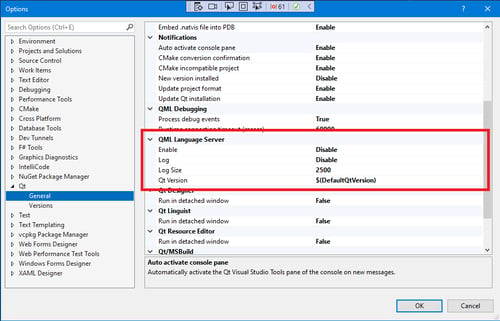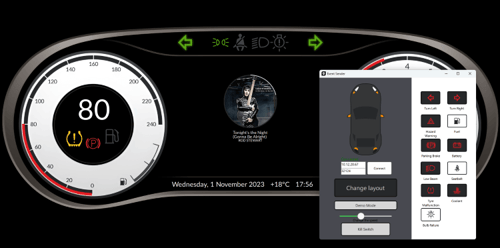Qt Customer Survey 2018
January 14, 2019 by Harald Kjølberg | Comments
The perpetual wheel of time turns, and 2018 is part of the past. For those of us not fortunate enough to have access to a DeLorean - fully equipped with Flux capacitor and a 1,21 GW power source - it is impossible to commit changes to this archived branch of time. What we can do, is to do a retrospect on 2018 and use the gained knowledge to improve during 2019. We are fortunate enough to have a lot of feedback provided by you in our 2018 Customer Survey, and it is about time we share some of the results with all of you.
Where's Qt used?
Not surprisingly, Qt is still used in the same markets and industries as previous years, i.e. enterprise applications, game development tools, robotics, smart homes and factories, test and measurement systems, consumer goods, automotive, healthcare and medical equipment, security systems, digital TVs, aerospace and so much more. We know that Qt is used by some of the largest space agencies, but we still can't confirm that Qt is in orbit or on its way to distant planets (I wanted to write galaxies, but that will most likely remain a dream for generations still).
Windows is by far the most common deployment platform, closely followed by a combination of Linux varieties and macOS. Deployment to Embedded Linux has increased with almost 10%, which confirms that the use of Qt in embedded devices is increasing. The fact that 20% deploys to mobile platforms (Android and iOS) is a good indication that we need to bring some more hay to those horses.
Technology and tools
User interface creation is one of the largest use-cases for Qt, and as such it is interesting to look at the use of the different UI technologies and how you use them. We have received a lot of feedback related to Qt Widgets, so let's get that rabbit out of the hat first; Qt Widgets are not dead or dying. We are still putting a lot of time and effort into Qt Widgets, and that is time well spent. Even though the use of Qt Widgets is slowly declining (about 6% per year), 75% of you are still using them to create user interfaces. There will not be any radical changes to Qt Widgets, but they will remain functional and available for many years. We may even throw in a couple of new widgets we have been specifically asked for. Where the use of Qt Widgets slowly decline, the use of Qt Quick increases fast. The use has increased with 15% since 2017, and Qt Quick is now used in 2 out of 3 projects. The use-cases certainly vary depending on the target platforms; Qt Widgets are more frequently used for desktop applications and Qt Quick favoured for embedded and mobile platforms. The trend is, however, the same, the use of Qt Widgets are slowly decreasing while Qt Quick is rapidly increasing.
When it comes to tools, the short story is that the tools that were important for you in 2017, remained important in 2018. Qt Creator is still numero uno, and most of you love it. That being said, we will continue to improve Qt Creator based on provided suggestions, requests and reported bugs. Tools for debugging, profiling and static code analysis are increasingly important, and we get good feedback on these as well. There are some tools that clearly aren't as useful and impressive, but the positive thing is that there is a good coherence between the tools you find important and the tools receiving most care and affection from our side.
Documentation
Looking into customer surveys are - and should be - a humbling activity, but when it comes to the documentation it is hard to not go completely narcissistic. Close to 100% regard the documentation as a very important part of Qt, and when you get feedback like "I wish all documentation was like this" it is hard not to break out in a huge grin. A huge thanks to everyone who contributes, or has contributed to, the great piece of work Qt Documentation is.
Related to documentation are the various other forms of learning, finding information and discussing everything Qt. This particular blog post may not find a way to the stars (again dreaming of Qt, and myself, on the way to those galaxies) but in general, you find our blog posts interesting. This inspires us to continue the work and you can look forward to many useful blog posts this year. The forums are still relevant for many, but we would like to see more activity on forum.qt.io, making it even more relevant and valuable for all. Live webinars seem to be losing some of the appeal. On the other hand, recorded webinars, training videos and tutorials are in high demand. We will do our best to adjust to these trends.
Satisfaction
It's always important for us to learn the hows, whats, and wheres of your Qt usage, but equally (if not more) important is the feedback on your satisfaction. Every year we ask how likely it is that you will recommend Qt to a friend or colleague, rated on a scale from 0 to 10 (10 being very likely). We would have liked to see the same overwhelming feedback as for the documentation, but it gives us confidence when 35% respond with 10. If we group together 7 to 10, we have the feedback from 91,7% of you, so all in all we are pretty certain that you in general are satisfied with Qt. We know, from the survey and other channels, that there are many things and areas we can improve, and we will strive to do that in the coming weeks, months and years.
Thank you for taking the time to respond to our customer survey! This is but a brief summary of the results and the huge amount of valuable feedback received. We will continue to work with the collected data and utilise it to make Qt even better in the future.
Blog Topics:
Comments
Subscribe to our newsletter
Subscribe Newsletter
Try Qt 6.7 Now!
Download the latest release here: www.qt.io/download.
Qt 6.7 focuses on the expansion of supported platforms and industry standards. This makes code written with Qt more sustainable and brings more value in Qt as a long-term investment.
We're Hiring
Check out all our open positions here and follow us on Instagram to see what it's like to be #QtPeople.



